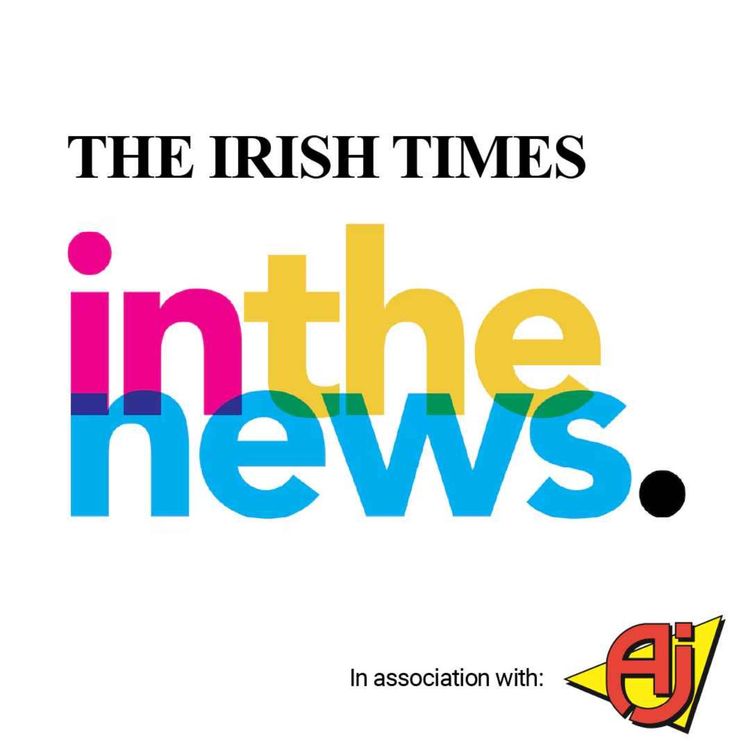Share

In The News
Too posh to police? Why garda numbers are falling
An Garda Siochana has a serious retention and recruitment problem.
The Commissioner knows it, so does the Minister for Justice but despite public commitments to reach enrolment targets, ongoing recruitment campaigns and changes to admission criteria, efforts to increase the size of the force to the Government benchmark of 15,000 continue to falter.
There are now fewer sworn Garda members than at the start of last year.
Why? It’s a well-paying public service job, it offers career variety and progression and it offers the possibility of retiring with a full pension at 60 or even earlier.
Crime and security editor Conor Lally tells In the News the many reasons why encouraging citizens to join up is an uphill battle and what it means for policing in the State.
Presented by Bernice Harrison. Produced by John Casey and Declan Conlon.
As we head into the New Year, The Irish Times wants to hear listener feedback on our two news podcasts; In The News and our more recently released sister podcast Early Edition.
This survey is open to anyone who has listened to either In The News or Early Edition- whether you listen regularly, occasionally, or have listened in the past.
This survey should take around 3-5 minutes to complete. All responses are anonymous.
More episodes
View all episodes

The killing of 'El Mencho': Why Mexico decided to take on the cartels
15:56|On Sunday, authorities in Mexico attempted to capture the notorious cartel boss known as “El Mencho”.They tracked Nemesio Rubén Oseguera Cervantes down to a cabin in the western state of Jalisco – his stronghold – and he was fatally wounded in the raid. The firefight also killed several of his heavily-armed accomplices, including his likely successor.He was head of the Jalisco New Generation Cartel (CJNG), known for trafficking vast quantities of fentanyl and cocaine into the US.In 2025 it was designated a foreign terrorist organisation by Donald Trump‘s administration.His death prompted waves of violent retaliation as the cartel put on a show of strength in areas far beyond Jalisco and into tourist hotspots.The authorities have calmed the situation – for now – but fears are mounting that more violence will erupt as the cartel seeks to regroup after the death of its leader.And that has brought the soccer World Cup – just months away – into sharp focus with questions about the ability of the Mexican authorities to keep soccer fans safe.Presented by Bernice Harrison. Produced by Declan Conlon.
Nancy Guthrie: the kidnapping gripping the US
29:26|Nancy Guthrie was last seen at her Tucson, Arizona, home on January 31st when her son-in-law dropped her off there after an evening at her daughter’s house nearby. She lived alone.Just hours later it is believed she was abducted from her home, her disappearance reported by friends the following day when she failed to show up for a church service.As the daughter of Savannah Guthrie, presenter of NBC’s Today show, she is well-known to audiences having appeared several times on screen.Every step of the investigation by local police and the FBI has been poured over by US media and true crime amateur sleuths.But the mystery remains. More than three weeks later, Nancy Guthrie is still missing.Richard Ruelas reporter from Arizona Republic has been covering the case from the beginning, visiting the scene many times and following every development.He explains why this case has gripped the US.Presented by Bernice Harrison. Produced by Suzanne Brennan.
Andrew Mountbatten-Windsor: Could Epstein links bring down the British monarchy?
24:16|Former British prince Andrew's fall from grace continued last week with his arrest as part of an investigation into whether he abused power by sharing confidential information with his friend Jeffrey Epstein. Up to now the scrutiny of Andrew's relationship with the notorious Epstein has focussed on allegations of sexual exploitation. But this affair has shifted the focus onto Andrew's conduct while working as a trade envoy for Britain. In that time he travelled the world at British taxpayers expense, promoting British business but also making plenty of connections that he would use to his own advantage. So what did Andrew get up to in those years? And how much did his mother, the late Queen Elizabeth, and his brother King Charles know about the way he was behaving and the people he was associating with? The answers could determine the future of the Royal Family. On today's In the News podcast we talk to Andrew Lownie, author of Entitled, a biography of Andrew and his ex-wife Sarah Ferguson.
Is The Monk a play, a pity party or PR spin for Gerry Hutch?
34:02|What started as a one-man play about the life and times of Gerry Hutch became a two-hander this week when, in a curtain-raising surprise, Hutch himself appears on stage to deliver a prologue.Rex Ryan premiered his play The Monk – called after the widely used nick-name of his subject – last summer but for its second outing it moved to a much larger Dublin venue, The Ambassador, for a weeklong run.Ryan, who produces, stars and directs The Monk is, says Irish Times crime and security editor Conor Lally, a powerful presence on stage.Hutch, adds little says Lally – except audience pulling power. He went along to a performance to see how Hutch, whose career he has followed closely, is portrayed. He gives his plain-speaking review here.Lally found the section on the murder of journalist Veronica Guerin deeply distasteful and the extent to which RTÉ journalist Paul Reynolds lives rent-free in Hutch’s head simply bizarre.Presented by Bernice Harrison. Produced by John Casey.
Irish tech feeding Russia's war machine: Why can't we stop it?
20:36|The Geran-2 is a deadly weapon; a drone bomb that can be launched from thousands of kilometres away and yet hit its target with precision accuracy.Low cost and easy to make, this winter it has become a key weapon in Russia’s armoury as it pummels Ukraine, causing hundreds of deaths and cutting off energy supply.And a key component in the Geran-2 design is a chip manufactured years ago by Taoglas, which is headquartered in Enniscorthy, Co Wexford.So how did it make its way into Russia’s armament supply chain – especially given EU rules which ban the export to Russia of “high priority” dual-use technology that can have both civilian and military applications.An investigation by The Irish Times in partnership with the Organised Crime and Corruption Reporting Project and others has revealed that technology from EU companies is making its way into Russia in vast quantities, where it is used in weapons such as the Geran-2.This includes various components manufactured by Taoglas and another Irish-based company, TE Connectivity.Irish Times crime and security correspondent Conor Gallagher was part of that investigative consortium and he explains how these drones work and why stopping their manufacture has proven difficult.Presented by Bernice Harrison. Produced by Suzanne Brennan.
How tip-off about land near Larry Murphy home led to dig for murdered women
21:38|The tip-off that led the Garda to begin a major search for the bodies of Jo Jo Dullard and Deirdre Jacob is likely not new according to crime and security editor Conor Lally. The piece of land on the border of counties Wicklow and Kildare has been in the Garda’s sights for many years but since the disappearance of the young women, missing since the 1990s, are now considered murders, ongoing reviews of the files bring new leads and new thinking on the investigation.News on Monday that gardaí had begun an extensive dig on the land was accompanied by mention of Dullard and Jacob leading to speculation that it had been determined that both young women were the victims of the same murderer.Not so, says Lally, who notes that gardaí suspect Jacob, who disappeared in broad daylight, was killed by convicted rapist Larry Murphy, while Dullard was killed by an unknown male who gave her a lift as she tried to get home.Lally analyses this new phase in the investigation.Presented by Bernice Harrison. Produced by Suzanne Brennan.
Why did it take 13 months to identify man found dead in Phoenix Park?
20:11|Belfast man James O’Neill, or Jim as he was known, led an unconventional life. He was according to his family a highly intelligent man in his 40s who lived nomadically, sometimes sleeping rough, moving between cities. His body found was found in Dublin’s Phoenix Park in November 2023 but his parents, Paul and Ann O’Neill were not informed of their son’s death until 13 months later. That’s because his body was not identified when he was found or during the postmortem despite the fact that he had nine forms of ID in the pocket of his anorak. So how were they found and why did it take so long to find them? Irish Times columnist Una Mullally talked to his parents about their son and about the questions they want answered by Fiosrú, the Office of the Garda Ombudsman, which is investigating the force’s handling of the puzzling case. Presented by Bernice Harrison. Produced by Suzanne Brennan.
How frightened should we be of ultra-processed food?
23:53|Ultra-processed foods are irresistible – they’re made that way. The food manufacturers that dominate our supermarket shelves are constantly looking for ways to make us buy (and that means eat) more. And to find cheaper ingredients.But isn’t just about everything in our diet, apart from fresh fruit and vegetables, processed in some way? So why has ultra-processed food become the focus of so much concern and debate?Nutritionist Sarah Keogh gives her view on what’s happening on our plates.Presented by Bernice Harrison. Produced by Suzanne Brennan.
Inside Jeffrey Epstein's weird fascination with magicians
22:53|The Jeffrey Epstein files reveal the convicted child sex offender was fascinated by magicians, and detail a years-long relationship between Epstein and David Blaine as well as an FBI investigation into alleged sexual misconduct by David Copperfield.Since the files were released by the US department of justice two weeks ago, Irish Times journalist Naomi O’Leary has been combing through the documents.It is not, she says, an easy cache to navigate, with a clunky search function and opaque filing system.However she has been able to find multiple emails which reveal a relationship between Epstein and several famous magicians including Blaine and Copperfield – after the disgraced financier had been convicted and served prison time for soliciting sex with children.O’Leary came into studio to detail her experience of searching the consistently disturbing files – so big that only a fraction of them have been excavated by journalists worldwide. She explains how sex trafficker Epstein, collector of powerful people and expert at developing transactional relationships with them, had a weird fascination with magicians.Being mentioned in the Epstein files is not an indication of wrongdoing.Presented by Bernice Harrison. Produced by Suzanne Brennan and Andrew McNair.